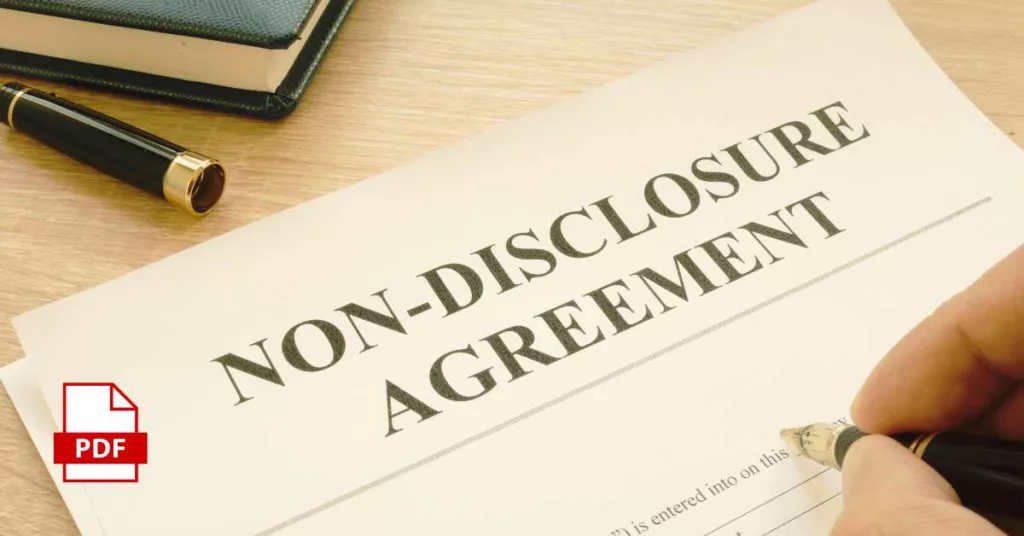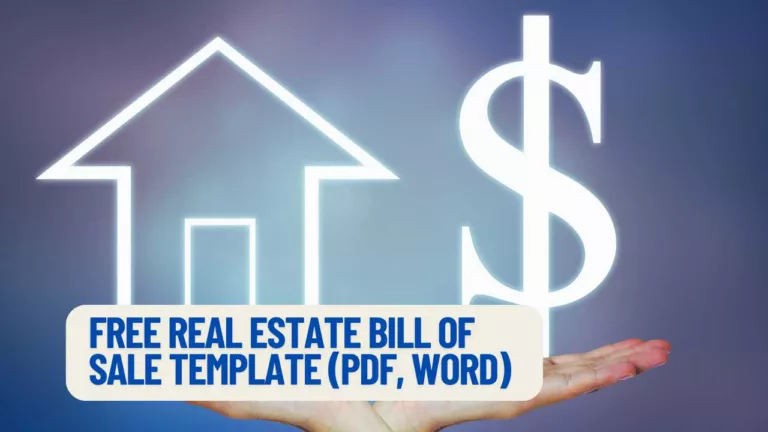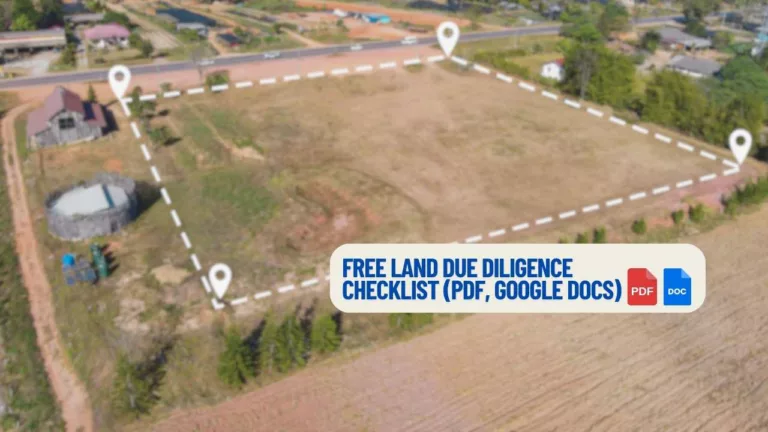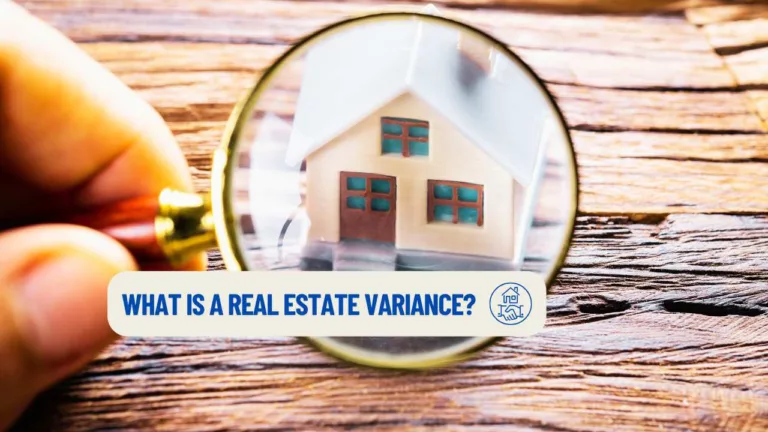
(Updated June 2025)

I’m a firm believer that clear communication builds trust, so I always ask a potential buyer to sign an NDA before we dive into the details. In my experience, these agreements come in many forms, but they all share the same goal. That is to maintain confidentiality around certain information like property income figures or environmental reports. As a broker once said to me, they found an NDA lets them share truly protected information, financial projections, development plans, or tenant services, without worrying about it leaking publicly. When I’m evaluating a deal, I use the NDA to set the period during which parties must keep contact details and strategic requests private. I invite you to use this document to help you show genuine interest in safeguarding your clients and their assets.
Disclaimer
This Real Estate Non-Disclosure Agreement (NDA) template is provided for informational purposes only and is not intended to serve as legal advice or an official legal document. By downloading or using this template, you acknowledge that you are doing so at your own risk and agree to consult a qualified legal professional to ensure the document aligns with your specific needs and complies with local laws. We expressly disclaim any guarantees or representations regarding the legal validity, enforceability, completeness, or suitability of this template for your particular transaction. Any reliance on or use of this document without professional customization is solely at your own discretion and risk. Furthermore, by using this template, you agree to hold the provider of this content harmless from any claims, liabilities, or damages arising from its use. For comprehensive legal advice or any concerns about your transaction, we strongly encourage you to seek guidance from a licensed attorney or legal expert in your jurisdiction.
Elements to Include in a Real Estate NDA
Key Elements for a Real Estate NDA Template
- Title and Identification
- Real estate non-disclosure agreement
- Non-disclosure agreement (NDA)
- Confidentiality agreement
- Parties Involved
- Disclosing party
- Other party
- Parties involved
- Buyer
- Seller
- Agent
- Landlord
- Tenant
- Prospective tenant
- Definition of Confidential Information
- Confidential information
- Sensitive information
- Private
- Protected
- Details
- Documents
- Materials
- Supplied information
- Obligations and Restrictions
- Obligation
- Unauthorized disclosure
- Parties agree
- Remain in confidence
- Limit competition
- Disclose
- Public knowledge
- General public
- Legal and Enforcement Terms
- Legally binding document
- Legal contract
- Legal action
- Injunctive relief
- Court
- Law
- Purpose and Scope
- Facilitate
- Intended
- Purchasing
- Sale
- Business
- Commercial real estate
- Property
- Interests
- Duration and Termination
- End date
- Signatures and Execution
- Sign
- Date
- Printed
- Address
Exclusions and Clarifications
- Public knowledge (to clarify what is not considered confidential).
- Other contracts (to make it sure the NDA does not conflict with other agreements).

Sample Real Estate Non-Disclosure Agreement (NDA) Template
This Non-Disclosure Agreement (the “Agreement”) is entered into as of [Insert Date] by and between
Parties
- Disclosing Party: [Insert Name], located at [Insert Address]
- Receiving Party: [Insert Name], located at [Insert Address]
(Collectively referred to as the “Parties”)
1. Purpose
The Parties agree to protect certain Confidential Information disclosed in relation to [describe the transaction, e.g., “the evaluation of property located at [Insert Property Address] for potential purchase, lease, or other real estate transaction”].
2. Definition of Confidential Information
“Confidential Information” refers to any non-public, proprietary, or sensitive information disclosed by the Disclosing Party, including but not limited to:
- Property details, documents, and materials
- Financial information related to the property
- Information about tenants, suppliers, or customers
- All other materials marked as “confidential” or identified as such during disclosure
Confidential Information does NOT include
- Information that is already in the public domain
- Information independently developed by the Receiving Party without use of the disclosed Confidential Information
- Information received from a third party without a breach of obligations
3. Obligations and Restrictions
The Receiving Party agrees to:
- Maintain the confidentiality of all disclosed information and not share it with unauthorized parties.
- Use the Confidential Information solely for the purpose specified above.
- Take all reasonable measures to verify employees, agents, and third parties comply with confidentiality obligations.
The Receiving Party agrees NOT to
- Reproduce, disclose, or use the Confidential Information for purposes outside the Agreement.
- Release information into the public domain without prior written consent from the Disclosing Party.
4. Duration and Termination
This Agreement begins on the date signed and continues for [Insert Duration, e.g., “2 years”] unless terminated by mutual written consent. The obligation to protect Confidential Information survives termination of this Agreement.
5. Legal and Enforcement Terms
The Receiving Party acknowledges that any unauthorized disclosure or use of Confidential Information will cause irreparable harm to the Disclosing Party. Therefore:
- The Disclosing Party is entitled to injunctive relief and other remedies provided by law.
- This Agreement constitutes a legally binding document and will be governed under the laws of [Insert Jurisdiction].
- Any disputes will be resolved in the courts of [Insert Jurisdiction].
6. Signatures and Execution
The Parties acknowledge they have reviewed and understand this Agreement and agree to its terms.
Disclosing Party
Name (Printed): _______________________________
Signature: ____________________________________
Date: ________________________________________
Receiving Party
Name (Printed): _______________________________
Signature: ____________________________________
Date: ________________________________________
Witness (Optional)
Name (Printed): _______________________________
Signature: ____________________________________
Date: ________________________________________
This template can be downloaded, filled out with the specific transaction details, and used in any real estate transaction requiring confidentiality.
Always consult a legal professional to make sure it complies with local laws and practices.

What is a Confidentiality Agreement in Real Estate?
A Confidentiality Agreement in real estate is a legally binding document designed to protect sensitive information shared between parties during a property transaction. It make it so that confidential data, such as financial details, business operations, or other proprietary information, is not disclosed to third parties without proper authorization. This agreement is often referred to as a Non-Disclosure Agreement (NDA) and is commonly used in commercial real estate, though it can also apply to residential transactions.
Purpose of a Confidentiality Agreement
The primary purpose of a Confidentiality Agreement is to establish trust between the parties involved by safeguarding private information. Real estate transactions, especially those involving commercial properties, often require the sharing of critical details that could impact negotiations if they fall into the wrong hands.
For example, a property seller might disclose financial statements, tenant leases, or operational data, while a buyer might share their funding sources or business plans. The agreement makes sure that this exchange of information remains secure throughout the process.
Why is it Important in Real Estate Transactions?
Confidentiality Agreements play a vital role in protecting the privacy and security of sensitive information during real estate transactions. Here’s why they are important:
Protects Competitive Advantage
For commercial properties, divulging financial data or tenant agreements could impact the owner’s competitive position in the market. A Confidentiality Agreement prevents such risks.
Mitigates Legal Risks
Clearly defining the obligations of each party enables the agreement helps minimize misunderstandings and potential legal disputes.
Builds Trust
Parties are more likely to engage openly and collaborate when there’s a clear commitment to confidentiality, fostering a smoother transaction process.
Preserves Negotiation Leverage
I think it is important to secure sensitive information and double check that it is protected, this prevents one party from gaining an unfair advantage during negotiations.

Check Back for Updates to this NDA for Real Estate
I’m constantly refining this real estate non disclosure agreement to address what a seller may want and what a potential buyer expects when requesting access to sensitive data. I hope you will bookmark or share this page and check back for updates. I’m going to try and make each revision clarifies the period during which the NDA in real estate remains in effect and outlines how a buyer’s future inquiries will be handled. Your feedback helps me keep the agreement tight and practical for every deal.
About the Author

Joseph E. Stephenson, REALTOR®
License #00054082 | Kansas & Missouri
Affiliated with Welch & Company (License #CO00000477)
Joseph E. Stephenson is a licensed real estate professional in Kansas and Missouri with a career built on dedication to integrity and client-focused service. To learn more about how Joseph can assist you in your real estate endeavors, visit his REALTOR® profile at realtor.com.
Verify Joe’s Real Estate License Credentials
Real Estate Agent License VerificationVerify Joe’s Business Credentials
Joseph E. Stephenson also operates a business named Stephenson Residential, LLC. You can verify the business at the Kansas Secretary of State’s website.
Verify Business Credentials






